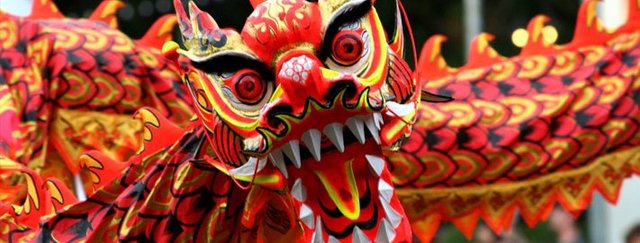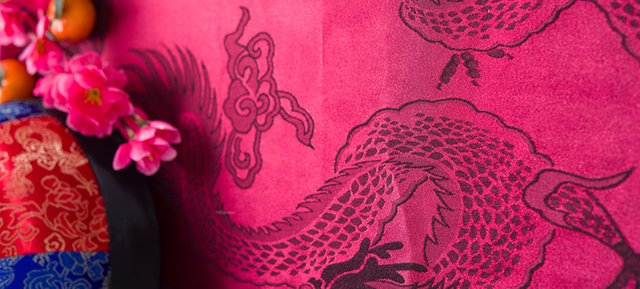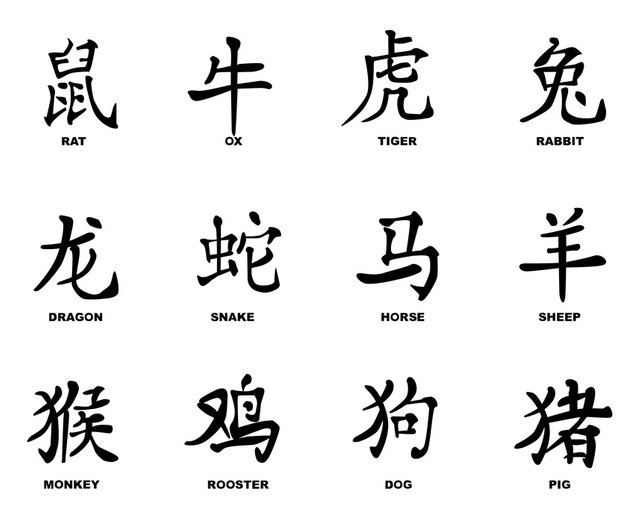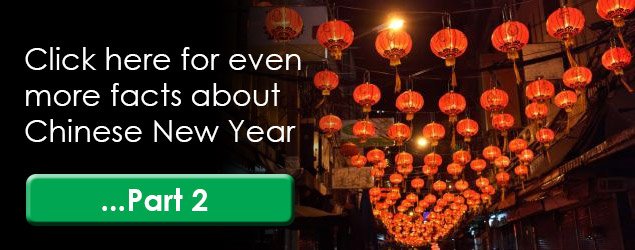21 Fun Facts about the Chinese New Year
Hi,Steemit Uses today I want to talk about"21 Fun Facts about the Chinese New Year"

Chinese New Year falls on February 16th 2018. Each year is assigned one of 12 Zodiac signs with an associated animal. 2018 will be the Year of the Dog. The Chinese believe that each sign has associated characteristics, with people born under the dog sign believed to be very loyal. Honest, helpful, and steadfast to the point of stubbornness, Dogs are outwardly popular but often suffer from anxiety.
In addition to designating an animal for each year, the Chinese zodiac also cycles through the five elements of nature: Earth, Wind, Water, Fire, and Metal.
Expecting a new addition in 2018? Babies born this year will be Earth Dogs. According to this Chinese astrology guide,
“Earth dogs are broad-minded, faithful, considerate, well-disciplined and they stick to principles. Also, they are grateful, chivalrous, brave and have the courage to take the blame for what they do, thus it’s easy for them to offend somebody. Earth dogs always have clear goals and they are self-poised towards success and failure, never compromising their conscience to do things. They are persistent and never give up. They believe in the life philosophy of taking their own road in a down-to-earth manner. Although earth dogs are very capricious sometimes, they never hurt others arbitrarily and they respect the other’s position and attitude rather than forcing the other to accept their opinions. Earth dogs don’t like to interfere in the life of others, vice versa.
Earth dogs have the artistic spirit, so it’s not suitable for them to work in industry and commerce circles with fierce competition and internal strife. It doesn’t mean that their physical strength or fighting spirit is inferior to others, but their practice and personality cannot cater to others in this complicated society.”
Previous Dog years include 2006, 1994, 1982, 1970, 1958 and 1946. Famous “Earth Dog” celebrities include Madonna, Al Capone, Billy Idol, and Michael Jackson.
Were you born in the Year of the Dog? Watch out! According to Chinese astrology, 2018 will be unlucky for you.
To help you celebrate, here are some fun facts about this holiday:
- Chinese hold their new year celebrations between the 21st of January and February 20th, depending on the Chinese lunar calendar; so although calendar years have a fixed start and end date, the Chinese New Year can be any of 31 different dates!
- A typical Chinese New Year celebration lasts for 15 days, the longest festival in the Chinese calendar. The day itself is a public holiday not just in China but in many other countries, including the Philippines, Malaysia and Indonesia. Additionally, the day is celebrated worldwide by Chinese communities.
- **The New Year celebrations typically take place at home, and the events are very family-oriented. Naturally, this can cause the country’s transport networks to come to a standstill as everyone travels to see their relatives and loved ones. it is estimated that more than 200 million Chinese undertake long journeys to return home for the celebrations. It’s the largest human migration anywhere. The Chinese call the phenomenon chunyun (春运), or “Spring Migration.” **
- The celebration is actually known as “Spring Festival” (chunjie, 春节) in China, even though it falls in the middle of the winter! This is because the ancient solar calendar, which depicts 24 periods through the year, classifies the start of Spring as the period from February 4th to 18th.
- It is considered good luck to thoroughly clean the house for the festival, thus getting rid of any bad feelings. Failing to do so can bring dishonour and bad luck to the family rather than the good fortune that everyone would like.
- However, from New Year’s Day to February 5th, sweeping and throwing out the garbage are forbidden, lest you throw away the new year’s good luck.
- The main celebrations usually begin with a family gathering and meal on the eve of the Spring Festival. A typical meal will include extra luxuries and special treats as well as typical fish or chicken dishes. This is also an opportunity for the family to get together and exchange gifts.

- Chinese families will usually fill their houses with red decorations as this is held to be a very lucky colour. The streets and public places may also be filled with red banners and signs at this time.
- Most homes will include strips of red paper, known as “Chunlian”. These contain messages known as Spring Couplets and usually convey messages of good health and fortune. A typical decoration contains four Chinese characters in gold writing – these are known as “Hui Chun”.
- It is a tradition for younger family members to receive gifts of cash from older relatives, rather than wrapped presents; the money is generally given in a red envelope, to reinforce the positive feeling. It is also common for employees to get such cash gifts as bonuses from their employers.
- China is home to the world’s fireworks industry and the Spring festival will see hundreds of thousands of displays and organised events, as well as millions of fireworks lit at home. The tradition is that the fireworks scare away evil spirits and demons. The largest displays are set off around midnight, similarly to January 1st New Year celebrations worldwide.

- The two weeks of celebrations usually end with a Lantern Festival; on the eve of the 15th day, families and friends again come together to eat and to put up lanterns or release them into the skies.
- The Lantern Festival falls on the night of the first full moon of the Chinese New Year.
- The Chinese expression for Happy New Year is “Xinnian Kuaile”, which is pronounced as “sshin-nyen kwhy-luh”. It is common for the Chinese to greet strangers as well as friends at this time, to pass on good luck and fortune for the year ahead.
- Children remain off school throughout the holiday period, and can even go a whole month before returning to the classroom.
- No list of fun facts about Chinese New Year would be complete without mention of a monster! Tradition says that Nian, a ferocious beast who preys on humans, emerges from his hiding place on New Year’s Eve, but is frightened off by the red decorations and banners!
- Traditional foods include fish, which is served at the end of the New Year’s meal and symbolizes abundance, and a sticky fruitcake called Neen Gow or Nian Gow. Why rice cakes? The “gow” sounds like the Chinese word gāo (高), which means “high.” Eating Nian Gow symbolizes the desire for the coming year to be better than the last.
- *Shou Sui *is the practice of staying up until midnight as a family to greet the new year.
- During the Chinese New Year, people often greet each other by shouting “auspicious phrases” thought to bring luck, like “gōng xǐ fā cái,” which translates to “Congratulations and be prosperous.” Children sometimes use the following variant of this greeting when they are feeling cheeky: “gōng xǐ fā cái, hóng bāo ná lái.” That means “Congratulations and be prosperous, now give me a red envelope!”
- To ensure a prosperous New Year, Chinese lore has a rather long list of things you must not do during the Spring Festival: No saying “negative” words like “death” or “sickness”, no using scissors or knives, no cutting hair, and no fighting, just to name a few.
- **Wealthy Chinese people are increasingly using the holiday time to travel abroad. In 2018, 6.5 million Chinese were expected to travel outside of the country for the Spring Festival. **
The Chinese New Year is celebrated worldwide
In addition to China, Spring Festival celebrations are organised in dozens of countries around the world, with in excess of 2 billion people taking part; countries such as Malaysia and the Philippines have huge celebrations, while communities gather in Chinatowns worldwide to hold events and set off fireworks and lanterns. Public holidays lasting from one to four days are common throughout Asia, while celebrations can extend for a week in Vietnam.
Hong Kong usually holds a major horse racing festival at this time, which proves extremely popular with its citizens and visitors – events include fireworks, theatrical shows and many other displays. The events in Hong Kong are considered to be among the very best celebrations in the world each year; as well as fantastic major events there are also many bargains on offer from shops and companies across the city, and huge amounts of beautiful flowers used for decoration and display.
Major western capitals such as London hold their own Chinese New Year celebrations; London often sees more than half a million people across the city taking part in organised events. It’s been estimated that some 4 million journeys take place, not just in China but in other countries, as people make their way home for the festival and celebrations.
So which Chinese Zodiac Animal represents you?
Below you can see the Chinese translation of each of the animals in the zodiac, further down you can check the animal that represents you by looking up the year you were born in the table.

| Year | Chinese New Year Dates | Animal Sign |
|---|---|---|
| 1930 | 1930-01-29 | Horse (1930-01-29—1931-02-16) |
| 1931 | 1931-02-17 | Sheep (1931-02-17—1932-02-05) |
| 1932 | 1932-02-06 | Monkey (1932-02-06—1933-01-25) |
| 1933 | 1933-01-26 | Rooster (1933-01-26—1934-02-13) |
| 1934 | 1934-02-14 | Dog (1934-02-14—1935-02-03) |
| 1935 | 1935-02-04 | Pig (1935-02-04—1936-01-23) |
| 1936 | 1936-01-24 | Rat (1936-01-24—1937-02-10) |
| 1937 | 1937-02-11 | Ox (1937-02-11—1938-01-30) |
| 1938 | 1938-01-31 | Tiger (1938-01-31—1939-02-18) |
| 1939 | 1939-02-19 | Rabbit (1939-02-19—1940-02-07) |
| 1940 | 1940-02-08 | Dragon (1940-02-08—1941-01-26) |
| 1941 | 1941-01-27 | Snake (1941-01-27—1942-02-14) |
| 1942 | 1942-02-15 | Horse (1942-02-15—1943-02-03) |
| 1943 | 1943-02-04 | Sheep (1943-02-04—1944-01-24) |
| 1944 | 1944-01-25 | Monkey (1944-01-25—1945-02-12) |
| 1945 | 1945-02-13 | Rooster (1945-02-13—1946-01-31) |
| 1946 | 1946-02-01 | Dog (1946-02-01—1947-01-21) |
| 1947 | 1947-01-22 | Pig (1947-01-22—1948-02-09) |
| 1948 | 1948-02-10 | Rat (1948-02-10—1949-01-28) |
| 1949 | 1949-01-29 | Ox (1949-01-29—1950-02-16) |
| 1950 | 1950-02-17 | Tiger (1950-02-17—1951-02-05) |
| 1951 | 1951-02-06 | Rabbit (1951-02-06—1952-01-26) |
| 1952 | 1952-01-27 | Dragon (1952-01-27—1953-02-13) |
| 1953 | 1953-02-14 | Snake (1953-02-14—1954-02-02) |
| 1954 | 1954-02-03 | Horse (1954-02-03—1955-01-23) |
| 1955 | 1955-01-24 | Sheep (1955-01-24—1956-02-11) |
| 1956 | 1956-02-12 | Monkey (1956-02-12—1957-01-30) |
| 1957 | 1957-01-31 | Rooster (1957-01-31—1958-02-17) |
| 1958 | 1958-02-18 | Dog (1958-02-18—1959-02-07) |
| 1959 | 1959-02-08 | Pig (1959-02-08—1960-01-27) |
| 1960 | 1960-01-28 | Rat (1960-01-28—1961-02-14) |
| 1961 | 1961-02-15 | Ox (1961-02-15—1962-02-04) |
| 1962 | 1962-02-05 | Tiger (1962-02-05—1963-01-24) |
| 1963 | 1963-01-25 | Rabbit (1963-01-25—1964-02-12) |
| 1964 | 1964-02-13 | Dragon (1964-02-13—1965-02-01) |
| 1965 | 1965-02-02 | Snake (1965-02-02—1966-01-20) |
| 1966 | 1966-01-21 | Horse (1966-01-21—1967-02-08) |
| 1967 | 1967-02-09 | Sheep (1967-02-09—1968-01-29) |
| 1968 | 1968-01-30 | Monkey (1968-01-30—1969-02-16) |
| 1969 | 1969-02-17 | Rooster (1969-02-17—1970-02-05) |
| 1970 | 1970-02-06 | Dog (1970-02-06—1971-01-26) |
| 1971 | 1971-01-27 | Pig (1971-01-27—1972-02-14) |
| 1972 | 1972-02-15 | Rat (1972-02-15—1973-02-02) |
| 1973 | 1973-02-03 | Ox (1973-02-03—1974-01-22) |
| 1974 | 1974-01-23 | Tiger (1974-01-23—1975-02-10) |
| 1975 | 1975-02-11 | Rabbit (1975-02-11—1976-01-30) |
| 1976 | 1976-01-31 | Dragon (1976-01-31—1977-02-17) |
| 1977 | 1977-02-18 | Snake (1977-02-18—1978-02-06) |
| 1978 | 1978-02-07 | Horse (1978-02-07—1979-01-27) |
| 1979 | 1979-01-28 | Sheep (1979-01-28—1980-02-15) |
| 1980 | 1980-02-16 | Monkey (1980-02-16—1981-02-04) |
| 1981 | 1981-02-05 | Rooster (1981-02-05—1982-01-24) |
| 1982 | 1982-01-25 | Dog (1982-01-25—1983-02-12) |
| 1983 | 1983-02-13 | Pig (1983-02-13—1984-02-01) |
| 1984 | 1984-02-02 | Rat (1984-02-02—1985-02-19) |
| 1985 | 1985-02-20 | Ox (1985-02-20—1986-02-08) |
| 1986 | 1986-02-09 | Tiger (1986-02-09—1987-01-28) |
| 1987 | 1987-01-29 | Rabbit (1987-01-29—1988-02-16) |
| 1988 | 1988-02-17 | Dragon (1988-02-17—1989-02-05) |
| 1989 | 1989-02-06 | Snake (1989-02-06—1990-01-26) |
| 1990 | 1990-01-27 | Horse (1990-01-27—1991-02-14) |
| 1991 | 1991-02-15 | Sheep (1991-02-15—1992-02-03) |
| 1992 | 1992-02-04 | Monkey (1992-02-04—1993-01-22) |
| 1993 | 1993-01-23 | Rooster (1993-01-23—1994-02-09) |
| 1994 | 1994-02-10 | Dog (1994-02-10—1995-01-30) |
| 1995 | 1995-01-31 | Pig (1995-01-31—1996-02-18) |
| 1996 | 1996-02-19 | Rat (1996-02-19—1997-02-06) |
| 1997 | 1997-02-07 | Ox (1997-02-07—1998-01-27) |
| 1998 | 1998-01-28 | Tiger (1998-01-28—1999-02-15) |
| 1999 | 1999-02-16 | Rabbit (1999-02-16—2000-02-04) |
| 2000 | 2000-02-05 | Dragon (2000-02-05—2001-01-23) |
| 2001 | 2001-01-24 | Snake (2001-01-24—2002-02-11) |
| 2002 | 2002-02-12 | Horse (2002-02-12—2003-01-31) |
| 2003 | 2003-02-01 | Sheep (2003-02-01—2004-01-21) |
| 2004 | 2004-01-22 | Monkey (2004-01-22—2005-02-08) |
| 2005 | 2005-02-09 | Rooster (2005-02-09—2006-01-28) |
| 2006 | 2006-01-29 | Dog (2006-01-29—2007-02-17) |
| 2007 | 2007-02-18 | Pig (2007-02-18—2008-02-06) |
| 2008 | 2008-02-07 | Rat (2008-02-07—2009-01-25) |
| 2009 | 2009-01-26 | Ox (2009-01-26—2010-02-13) |
| 2010 | 2010-02-14 | Tiger (2010-02-14—2011-02-02) |
| 2011 | 2011-02-03 | Rabbit (2011-02-03—2012-01-22) |
| 2012 | 2012-01-23 | Dragon (2012-01-23—2013-02-09) |
| 2013 | 2013-02-10 | Snake (2013-02-10—2014-01-30) |
| 2014 | 2014-01-31 | Horse (2014-01-31—2015-02-18) |
| 2015 | 2015-02-19 | Sheep (2015-02-19—2016-02-07) |
| 2016 | 2016-02-08 | Monkey (2016-02-08—2017-01-27) |
| 2017 | 2017-01-28 | Rooster (2017-01-28—2018-02-15) |
| 2018 | 2018-02-16 | Dog (2018-02-16—2019-02-04) |
| 2019 | 2019-02-05 | Pig (2019-02-05—2020-01-24) |
| 2020 | 2020-01-25 | Rat (2020-01-25—2021-02-11) |
| 2021 | 2021-02-12 | Ox (2021-02-12—2022-01-31) |
| 2022 | 2022-02-01 | Tiger (2022-02-01—2023-01-21) |
| 2023 | 2023-01-22 | Rabbit (2023-01-22—2024-02-09) |
| 2024 | 2024-02-10 | Dragon (2024-02-10—2025-01-28) |
| 2025 | 2025-01-29 | Snake (2025-01-29—2026-02-16) |
| 2026 | 2026-02-17 | Horse (2026-02-17—2027-02-05) |
| 2027 | 2027-02-06 | Sheep (2027-02-06—2028-01-25) |
| 2028 | 2028-01-26 | Monkey (2028-01-26—2029-02-12) |
| 2029 | 2029-02-13 | Rooster (2029-02-13—2030-02-02) |
| 2030 | 2030-02-03 | Dog (2030-02-03—2031-01-22) |
Author: NICHOLAS
.gif)
